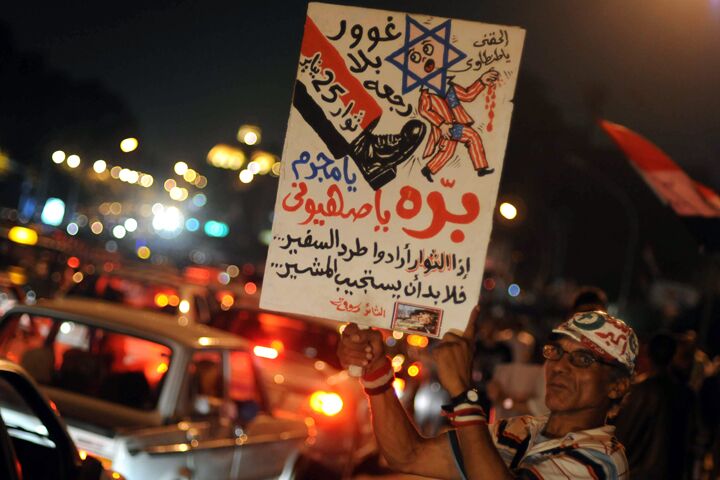
Israel Reels as Key Regional Alliances Break Down
Last Friday, just a week after Israel’s ambassador to Turkey was expelled, the Israeli Embassy in Cairo was ransacked. The two events add up to show that, as the “Arab Spring” fades into fall, Israel is becoming increasingly isolated in a radically changing Middle East—a Middle East in which ties between Israel and its two most important regional allies are rapidly fraying.
“The diplomatic crisis, in which winds unleashed by the Arab Spring are now casting a chill over the region, was crystallized by the scene of Israeli military jets sweeping into Cairo at dawn on Saturday to evacuate diplomats after the Israeli Embassy had been besieged by thousands of protesters,” said New York Times Jerusalem Bureau chief Ethan Bronner on Saturday.
Bronner continued:
The growing hostility from Egypt could require a radical rethinking of Israel’s defense doctrine which, for the past three decades, counted on peace on its southern border. As chaos in the Sinai has increased and anti-Israel sentiment in Egypt has grown, military strategists here are examining how to beef up protection of the south, including by the building of an anti-infiltration wall in the Sinai.
Both Egypt and Israel issued statements on Saturday reaffirming their commitment to the peace treaty between the two nations, but Israeli Prime Minister Benjamin Netanyahu said that Egypt “cannot ignore the heavy damage done to the fabric of peace.”
Eli Shaked, a former Israeli ambassador to Cairo, believes Friday’s attack on the Israeli Embassy was not just a momentary breakdown in an otherwise steady relationship, but an indication of Egypt’s political trajectory. “Egypt is not going toward democracy but toward Islamization. It is the same in Turkey and in Gaza. It is just like what happened in Iran in 1979,” he said.
Bard College professor of foreign affairs Walter Russell Mead agrees with Shaked’s assessment. Writing for the American Interest on Sunday, he said:
The attack on the Israeli Embassy in Cairo yesterday was the most troubling sign yet that the Egyptian revolution could morph into something much less constructive and stable than many had hoped.
Most Egyptians have never accepted the idea of diplomatic relations with Israel (even many of those who don’t want more wars also don’t want what they see as the shame and surrender of an Israeli Embassy on Egyptian territory). Attacking the embassy sends a thrill through the masses …. Attacking an embassy is a revolutionary act; it is a declaration that revolutionaries reject the international status quo and the current authorities who tamely agree to live within its limits. Like the Iranian seizure of the U.S. Embassy in 1979 it is an act that forces people to take sides. Parties and figures who condemn the attack on the Israeli Embassy risk losing public support; those who accept it find themselves committed to an increasingly radical course. … Either way, the embassy attack is more than a dramatic event. This is history on the march ….
Writing for the Jerusalem Post on Sunday, former Israeli ambassador to Egypt Zvi Mazel pointed out the key players behind Egypt’s radical shift: “[T]he Muslim Brothers and the ultra-nationalist movements, long repressed by the previous regime, are controlling the street and dictating their will to the army—while each fighting to shape the country their way. … Hatred towards Israel is the only common ground for the deeply divided forces battling for control in Egypt.”
Not surprisingly, the Islamic regime in Tehran, which has deep-rooted ties with the Muslim Brotherhood, has celebrated the embassy attack. The day after the ransacking, Ali Akbar Velayati, a senior adviser to Iran’s supreme leader on international affairs, said: “The seizure of the Zionist regime’s den of espionage in Cairo is a turning point in the contemporary history of Islam and the world. It seems huge developments in the region are at its beginning.”
In addition to the rifts emerging between Israel and its two most important regional allies, Israel is facing another potential predicament later this month when the Palestinians are scheduled to launch a bid for statehood with the United Nations. Israeli-Arab relations are plummeting to their lowest point in years.
Speaking on condition of anonymity, a European envoy in Jerusalem tied the three trends together: “Within a week Israel has found itself two friends down and about to face a so-called diplomatic tsunami with the Palestinians. I would be nervous if I was an Israeli diplomat today.”
Turkey was the first Muslim-majority nation to recognize Israel as a Jewish state back in 1949. Egypt was the first Arab state to sign a peace deal with Israel in 1979. The Palestinians live alongside and among the Israelis. Israel’s ties with its key allies are disintegrating, and the Jewish state is facing an international tidal wave at the United Nations. Initial Israeli worries about the Arab Spring revolutions have started to materialize in concrete and sobering ways. Israel is increasingly isolated in a radically morphing Middle East, and Bible prophecy says the situation will get considerably darker for the Jewish state before the dawn of peace finally breaks. To understand more, read our editor in chief’s eye-opening booklet Jerusalem in Prophecy.
